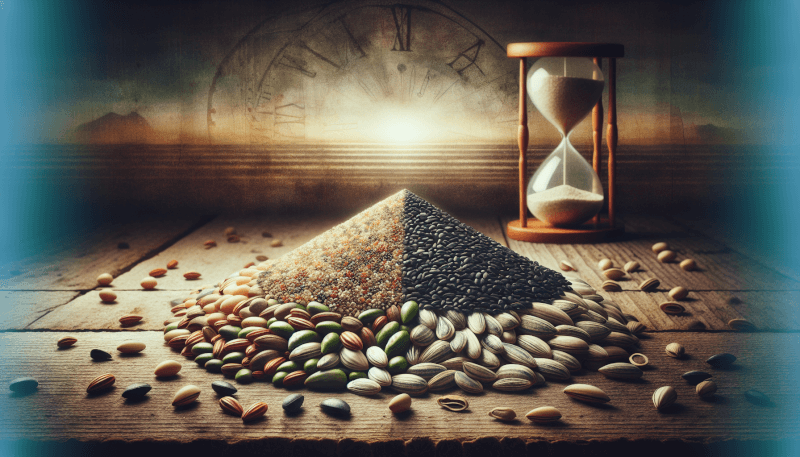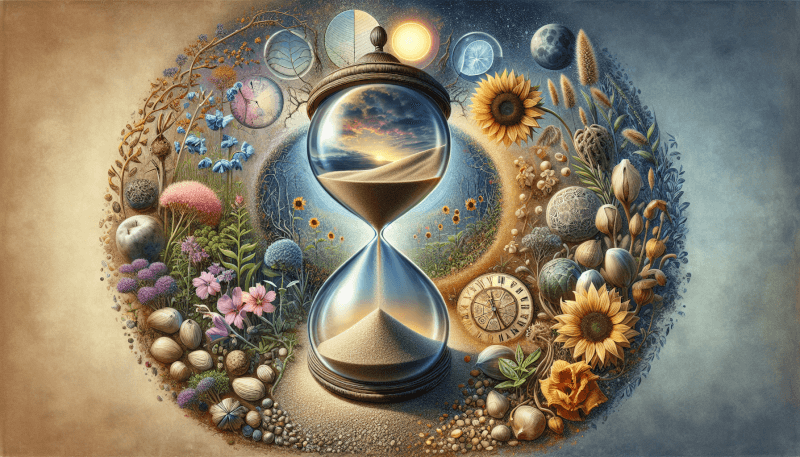Have you ever wondered if your garden seeds have an expiration date? It’s a common concern among gardeners who want to ensure the best results for their plants. In this article, we will explore the topic of garden seed expiration and provide some insights on what you need to know. Whether you’re a seasoned gardener or just starting out, understanding seed viability can help you plan and prepare for a successful growing season. So, let’s unravel the mystery and find out if garden seeds really do expire.

Factors that Impact Seed Lifespan
When it comes to gardening, seeds are the starting point for growing your favorite plants. However, not all seeds have an indefinite shelf life. Several factors can impact the lifespan of seeds, including the seed type, storage conditions, packaging, and seed viability. By understanding these factors, you can ensure that your seeds remain viable for as long as possible, maximizing your chances of successful germination and healthy plant growth.
Seed Type
Before delving into the factors that impact seed lifespan, it’s essential to understand the different types of seeds. Seeds can be broadly categorized into three types: annual seeds, biennial seeds, and perennial seeds. Each type has its own unique characteristics and lifespan.
Annual Seeds
Annual seeds are those that complete their lifecycle within a single growing season. These seeds germinate, grow, produce flowers or fruits, and then die within one year. Some common examples of annual plants include marigolds, zinnias, and tomatoes.
Biennial Seeds
Biennial seeds, as the name suggests, have a two-year lifecycle. In the first year, they germinate and grow vegetatively, forming a rosette of leaves. During the second year, biennial plants produce flowers, fruits, or seeds before completing their life cycle. Examples of biennial plants include carrots, parsley, and foxgloves.
Perennial Seeds
Perennial seeds have a longer lifespan compared to annual and biennial seeds. These seeds can remain viable for many years, and the plants that grow from them can live for multiple seasons. Perennials include a wide range of plants, such as roses, lavender, and daisies.
Annual Seeds
Now, let’s take a closer look at each seed type to understand their typical lifespan and signs of expiration.
Definition and Characteristics
Annual seeds, as mentioned earlier, complete their life cycle within one year. They usually have a rapid growth rate and can produce flowers or fruits relatively quickly. Annual plants are popular among gardeners for their ability to provide vibrant blooms and bountiful harvests within a short period.
Typical Lifespan
The lifespan of annual seeds varies depending on the specific plant species and how they are stored. In general, most annual seeds remain viable for two to five years. However, some seeds with a shorter lifespan, such as lettuce or parsley, may only last for a year or two.
Signs of Expired Annual Seeds
The primary indicator of expired annual seeds is a low germination rate. If you notice that only a few seeds sprout despite proper planting conditions, it’s likely that the majority of the seeds have lost their viability. Additionally, seeds that have become moldy, discolored, or shriveled are also indications of expired annual seeds.
Biennial Seeds
Moving on to biennial seeds, let’s explore their definition, characteristics, and signs of expiration.
Definition and Characteristics
Biennial seeds have a two-year lifecycle, as mentioned earlier. They often require a period of cold stratification to break dormancy and stimulate germination. Biennial plants usually form a rosette of leaves in their first year, focusing on vegetative growth. During the second year, they devote their energy towards forming flowers, fruits, and ultimately, seeds.
Typical Lifespan
The lifespan of biennial seeds can vary, but on average, they remain viable for about two to three years. It’s worth noting that biennial seeds tend to have a slightly shorter lifespan compared to annual and perennial seeds.
Signs of Expired Biennial Seeds
Similar to annual seeds, a low germination rate is a telltale sign of expired biennial seeds. Additionally, seeds with a moldy or rotten appearance are unlikely to sprout. It’s crucial to inspect the seeds before sowing to ensure their viability.

Perennial Seeds
Finally, let’s delve into perennial seeds, their characteristics, typical lifespan, and indicators of expiration.
Definition and Characteristics
Perennial seeds are those that can germinate and grow into plants that live for multiple seasons. These seeds have the ability to remain dormant for extended periods while still maintaining their viability. Perennial plants are known for their resilience and ability to withstand harsh weather conditions, making them favorites among gardeners looking for long-lasting beauty in their landscapes.
Typical Lifespan
Perennial seeds have the longest potential lifespan among the three seed types. Under proper storage conditions, these seeds can remain viable for many years, even up to a decade or more in some cases. However, it’s important to note that the viability of perennial seeds may gradually decrease over time, especially if they are not stored correctly.
Signs of Expired Perennial Seeds
Expired perennial seeds may exhibit similar signs as annual and biennial seeds, such as low germination rates and physical deterioration. However, given their longer lifespan, it’s also essential to consider the age of the seeds. The older the seeds are, the more likely they are to have reduced viability.
Storage Conditions
The way you store your seeds plays a crucial role in preserving their viability. Proper storage conditions can significantly extend the lifespan of seeds, allowing you to use them over multiple growing seasons. Let’s explore the key factors to consider when storing your seeds: temperature, humidity, and light exposure.
Temperature
Keeping seeds at the right temperature is critical to maintaining their viability. Most seeds prefer cool, but not freezing, temperatures for storage. Ideal temperatures usually range between 32°F (0°C) and 50°F (10°C). Avoid exposing seeds to extreme heat, as it can damage their viability.
Humidity
Seed storage containers should maintain a low relative humidity level to prevent moisture from damaging the seeds. Ideally, the relative humidity should be around 30% to 40%. Excessive moisture can lead to fungal growth or seed decay, negatively affecting seed viability.
Light Exposure
Seeds should be stored in a dark environment to minimize the exposure to light. Light can promote seed aging and reduce viability. It’s recommended to store seeds in opaque containers or envelopes to block out light effectively.

Packaging
The packaging of seeds also plays a significant role in their longevity. Proper packaging can protect seeds from moisture, light, and other environmental factors that could diminish their viability. Let’s explore some common packaging options for storing seeds.
Seed Packets
Seed packets are a popular choice for storing seeds. They are usually made of durable paper or plastic material and come with resealable closures to maintain the integrity of the seeds. Seed packets often include important information such as the plant variety, sowing instructions, and expiration date.
Sealed Containers
Sealed containers, such as glass jars or airtight plastic containers, are excellent options for long-term seed storage. These containers provide optimal protection against moisture, humidity, and light, helping to preserve seed viability over an extended period.
Bulk Storage
For gardeners who save seeds in larger quantities, bulk storage might be necessary. In this case, using moisture-proof and airtight containers, such as metal tins or plastic bags, can help maintain seed quality. It’s important to label the containers with the seed variety and storage date for easy identification.
Seed Viability
Seed viability refers to the potential of a seed to germinate and develop into a healthy plant. Several factors can influence the viability of seeds, including genetics, age, and external conditions. Understanding seed viability is crucial to determine if the seeds you have are still capable of producing viable plants.
Definition
Seed viability is a measure of the percentage of seeds in a given batch that are capable of germinating under ideal conditions. It represents the proportion of seeds that are still alive and capable of producing viable seedlings.
Factors Affecting Viability
The viability of seeds can be influenced by various factors. Genetic factors, including the quality of the parent plant, play a significant role in determining the potential lifespan of seeds. Additionally, the age of the seeds, storage conditions, and exposure to external factors such as temperature and moisture also impact seed viability.
Testing Seed Viability
To assess the viability of your seeds, you can perform a simple germination test. This involves planting a representative sample of seeds under optimal conditions and checking the percentage of seeds that sprout. A high germination rate indicates good viability, while a low rate may suggest expired or low-quality seeds.

Signs of Expired Seeds
Determining the viability of seeds is crucial for successful gardening. Several signs can indicate expired seeds that are unlikely to germinate and develop into healthy plants. Let’s explore some common indicators of expired seeds.
Low Germination Rate
A low germination rate is one of the most apparent signs of expired seeds. If only a small percentage of your seeds sprout during the germination process, it’s likely that the majority of the seeds have lost their viability.
Poor Seedling Growth
Even if some seeds manage to germinate, expired seeds often result in weak and stunted seedlings. If you notice that your seedlings are struggling to grow or failing to thrive despite proper care, it could be an indication of expired seeds.
Unusual Seed Appearance
Expired seeds may exhibit physical changes that indicate their lack of viability. Moldy, discolored, or shriveled seeds are likely to be expired and should not be used for planting.
Extending Seed Lifespan
While seeds naturally have a limited lifespan, there are steps you can take to extend their viability and maximize their lifespan. Proper storage, seed treatment, and seed saving techniques can significantly enhance the longevity of your seeds.
Proper Storage
As discussed earlier, storing seeds in cool, dry, and dark conditions is essential to preserve their viability. Ensure that your seeds are stored in containers that provide adequate protection against moisture, light, and temperature fluctuations.
Seed Treatment
Some seeds benefit from specific treatments before planting to enhance their germination and increase viability. Stratification, scarification, and soaking are common methods used to break seed dormancy and improve germination rates. Research the specific requirements of the seeds you have to determine if any treatment is recommended.
Seed Saving
Saving seeds from your own garden is not only cost-effective but can also help preserve the genetic diversity of plants. By properly harvesting and storing seeds from healthy and robust plants, you can ensure a continuous supply of viable seeds for future plantings.
In conclusion, the lifespan of seeds can be influenced by factors such as the seed type, storage conditions, packaging, and seed viability. Annual, biennial, and perennial seeds all have different lifespans, with perennials typically having the longest viability. Proper storage, including maintaining the right temperature, humidity, and light exposure, is crucial for preserving seed viability. Choosing suitable packaging, such as seed packets or sealed containers, can also contribute to maintaining seed quality. Regularly testing seed viability and recognizing signs of expired seeds, such as low germination rates and poor seedling growth, will help you make informed decisions about which seeds to plant. By following proper storage practices, utilizing seed treatments when necessary, and saving seeds from your own garden, you can extend the lifespan of your seeds and enjoy successful gardening for years to come.


